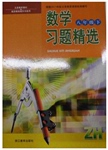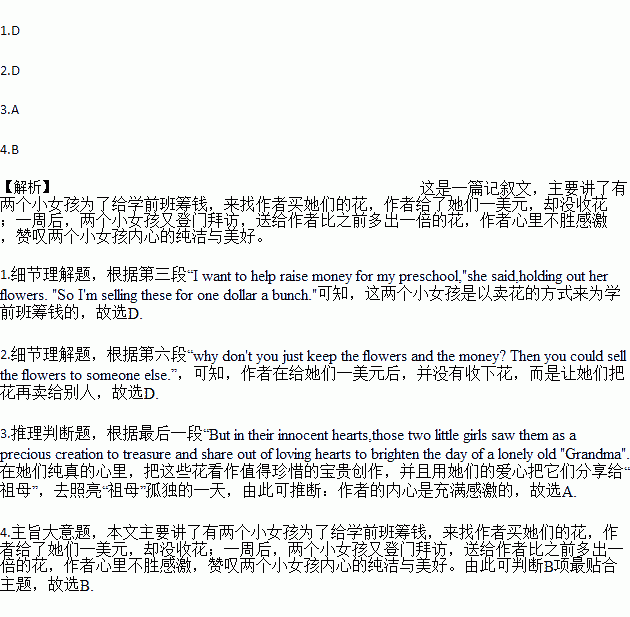题目内容
I opened my door to two little girls.I had met Alyssa,six,two weeks before.Since then,she'd waved to me every time she passed my house.
"Hello.Grandma Bonnie!"Alyssa said."This is my little sister,Ariana.She's three."To her very nervous sister,"It's OK,honey.You'll like her."The three-year-old held a "bouquet"(花束)in one hand,and the other gripped(紧握)a tiny notebook and a huge broken crayon."Go on,"her big sister urged,"tell her."
Ariana looked at me seriously."I want to help raise money for my preschool,"she said,holding out her flowers. "So I'm selling these for one dollar a bunch."
I had a hard time hiding my smile.The bouquet consisted of seven oxalis(醡浆草)flowers.Oxalis is a weed almost impossible to get rid of.Obviously Ariana had pulled these flowers out from her own yard or a neighbor's.
Her big sister smiled,"Aren't they lovely,Grandma Bonnie?And they only cost a dollar for the whole bunch.It's all for Ariana's preschool."The girls' plan did amuse me."All right," I agreed,"one dollar coming up."
Alyssa put the bill in her sister's skirt pocket.Then Ariana handed me my purchase."Uh,"I suggested,"why don't you just keep the flowers and the money? Then you could sell the flowers to someone else."Both girls stared at me, horrified."Oh,no,"Ariana cried."We picked them just for you.See,they're beautiful!"
And so they were.A week later,the flowers were twice as many as when my little neighbor handed them to me.What a bargain!
I had called these tiny plants "weeds"—disgusting,worthless things with no right to exist.But in their innocent hearts,those two little girls saw them as a precious creation to treasure and share out of loving hearts to brighten the day of a lonely old "Grandma".
1.Those two little girls paid a visit to the author to .
A. say hello to their new neighbor
B. introduce the little sister to her
C. bring her some beautiful flowers
D. collect money for a special purpose
2.What did the author want to do after knowing the girls' wish?
A. Refuse the girls' request directly.
B. Pay one dollar for the whole bunch.
C. Put the bill into the little girl's pocket.
D. Donate money without accepting flowers.
3.How did the author feel when seeing those tiny plants a week later?
A. Grateful. B. Disgusted.
C. Fortunate. D. Desperate.
4.What is the best title for the text?
A. Sold a Bunch of Flowers B. Picked Flowers Just for You
C. Raised Money for Preschool D. Delighted an Old Grandma
 习题精选系列答案
习题精选系列答案Should doctors ever lie to benefit their patients to speed recovery or to cover the coming of death? In medicine as in law, government, and other lines of work, the requirements of honesty often seem dwarfed by greater needs; the need to protect patients from brutal news, to uphold a promise of secrecy or to advance the public interest.
What should doctors say, for example, to a 46-year-old man coming in for a routine physical checkup just before going on vacation with his family who, though he feels in perfect health, is found to have a form of cancer that will cause him to die within six months? Is it best to tell him the truth? If he asks, should doctors reject that he is ill, or minimize the gravity of the illness? Should they at least hide the truth until after the family vacation?
Doctors face such choices often. At times, they see important reasons to lie for the patients’ own sake; in their eyes, such lies differ sharply from self-serving ones.
Studies show that most doctors sincerely believe that the seriously ill patients do not want to know the truth about their condition, and that informing them of risks destroys their hope, so that they may recover more slowly, or deteriorate faster, perhaps even commit suicide.
But other studies show that, contrary to the belief of many physicians, a great majority of patients do want to be told the truth, even about serious illness, and feel cheated when they learn that they have been misled. We are also learning that truthful information, humanely conveyed, helps patients cope with illness; help them tolerate pain better with less medicine, and even recover faster after surgery.
There is an urgent need to debate this issue openly. Not only in medicine, but in other professions as well, practitioners may find themselves repeatedly in difficulty where serious consequences seem avoidable only through deception. Yet the public has every reason to know the professional deception, for such practices are peculiarly likely to become deeply rooted, to spread, and to trust. Neither in medicine, nor in law, government, or the social sciences can there be comfort in the old saying, “What you don’t know can’t hurt you.”
Title: 1. Or Not
Different 2. | ·Most doctors are in 3. of lying for the patients’ own sake. |
·A great majority of patients 4. on being told the truth. | |
Reasons for 5. lying to patients | ·Informing patients of the truth about their condition destroys their hope, 6. to recovering more slowly, or deteriorating faster, perhaps even 7. themselves. |
Reasons 8. lying to patients | ·The truthful information helps patients to 9. their illness, help them tolerate pain better with less medicine, and even recover faster after surgery. ·Most patients feel 10. when they learn that they have been misled. |

